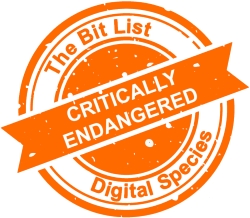Data Posted to Defunct or Little-used Social Media Platforms
 |
||
|
Older or less widely used social media platforms to which content has been uploaded but for which no guarantees have been made about the long term. |
||
|
Digital Species: Social Media |
Trend in 2023:
|
Consensus Decision |
|
Added to List: 2019 |
Trend in 2024:
|
Previously: Critically Endangered |
|
Imminence of Action Immediate action necessary. Where detected should be stabilized and reported as a matter of urgency. |
Significance of Loss The loss of tools, data or services within this group would impact on many people and sectors. |
Effort to Preserve | Inevitability Loss seems inevitable. Loss has already occurred or is expected to occur before tools or techniques develop. |
|
Examples BeBo, MySpace, Google Buzz, Parler and others. |
||
|
‘Practically Extinct’ in the Presence of Aggravating Conditions Closure of platform; lack of offline equivalent; lack of export functionality; no preservation undertaking from service provider; unstable business plan from service provider; Uncertainty over IPR or the presence of orphaned works. |
||
|
‘Endangered’ in the Presence of Good Practice Offline Replication; clear notice periods and alerts; committed ongoing maintenance of service. |
||
|
2023 Review This entry was nominated in 2017 and added to the Bit List following the 2019 assessment to highlight the different threats faced when attempting to preserve materials on older or defunct social media, emphasizing the different threats faced by social media users who uploaded content to defunct or little-used social media platforms. Because these services are older, the need to act is more urgent than for others. Often, the significance is only brought to attention once they are lost. The 2021 Jury noted a trend towards greater risk due to the existing risks of defunct or little-used platforms with recognition of the need to develop tools or techniques for applying to others that may follow the same path. The 2022 Taskforce agreed these risks remain on the same basis as before (no change to the trend). The 2023 Council agreed with the Critically Endangered classification. They noted an increase in imminence and effort to preserve, recognizing that while the need for major efforts to prevent or reduce losses continues on the same basis as before, it is now much more likely that loss of material has already occurred and will continue to do so by the time tools or techniques have been developed. Therefore, immediate action is necessary. They also recommended that the next major review for the Bit List consider merging this entry with the ‘Consumer Social Media Free at the Point of Use’ entry to provide examples of loss prompted by aggravating conditions. |
||
|
2024 Interim Review The 2024 Council agreed these risks remain on the same basis as before, with no significant trend towards even greater or reduced risk (‘No change’ to trend). They recommend combining this entry with ‘Consumer Social Media Free at the Point of Use’ by illustrating how social media is Practically Extinct in the presence of aggravating conditions, such as sudden loss or loss with little notice, citing examples such as GeoCities and MySpace. Additionally, they recommend that the 2025 review address recommendations about scoping or combining with ‘Consumer Social Media Free at Use’ and moving 'Defunct' social media into 'Consumer SM' as examples of extinct platforms. Additionally, ‘Lesser Known' platforms might be re-scoped as 'Local or Small Community' platforms, such as BBSs/Blogs maintained by a community, or national platforms like Skyblog (which has been successfully archived by Bibliothèque nationale de France). These smaller platforms may be at a lower risk of extinction due to fewer political/corporate entanglements and an invested user community who maintains them and can support archiving. |
||
|
Additional Comments The risk to this content depends on the specific service or platform, but older platforms (BeBo, MySpace) pose a higher risk of loss than current platforms (and is likely already lost) but social media wasn’t used to the same extent (and not as widely used by government, corporations, research institutions, etc.) in the early 2000s/2010s when these platforms were popular, which reduces the impact slightly. When looking at the digital preservation landscape and where we need to apply effort as well as resources, defunct early social media spaces are not high on the list; but, when considering how contemporary social media channels could become defunct, it becomes a different conversation because of how intrinsically tied they are to political discourse and influencing political opinion It is to be hoped that some of these have been archived via traditional web archiving, and so the remnants of these sites can be found in bits and pieces in various web archives, but it may be too late to save some of the content that is likely already lost. If some of this is still available, there may be hope in trying to preserve, but it may be difficult if the platforms are not willing to share data or work with preservationists. ArchiveTeam has stepped in here too. There is undoubtedly a story here that could be used as a call for arms to raise awareness about the preservation of current social media platforms too. Case Studies or Examples:
|
||





































































































































